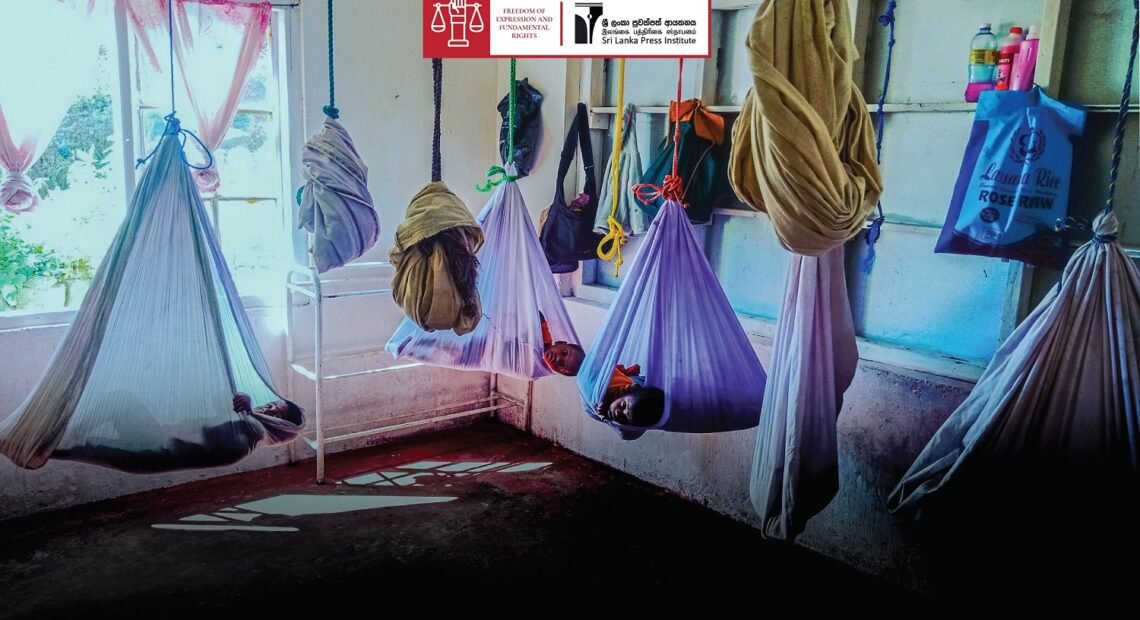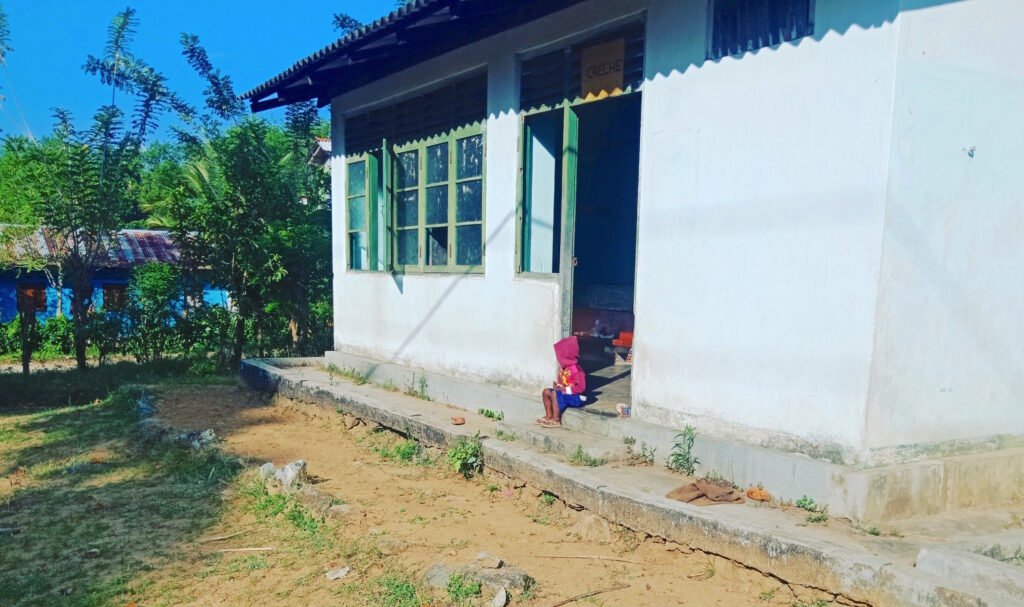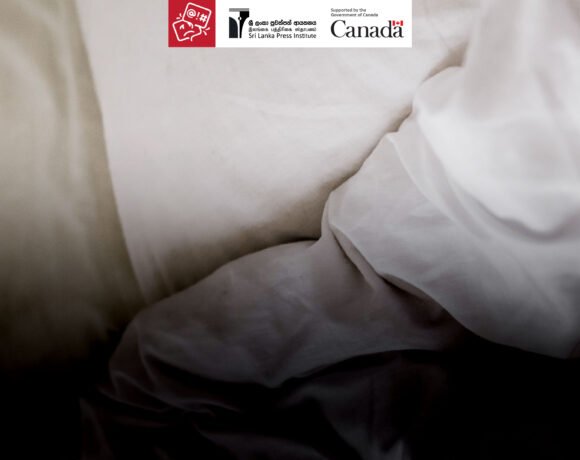
The Need to Improve Pre-Schools in the Estate Sector
Arul Karkki
The children who must be playful are sleeping in huts
The first five years of a child’s life is crucial because this is when the child’s physical, mental, cognitive, and linguistic development occurs. Studies show that 50% of mental development takes place in this period. Negative drives such as anger, fear, anxiety and repulsion also develop during this period. These conditions must be identified, and the child must be encouraged, pleased and disciplined during this period.
In the estate sector, parents have to keep their children in old-fashioned day-care centres called Pulle Madu when they are out of home for work. These open halls run by the estate management only give food prepared by parents to the children and look into their security. Each Pulle Madu is set up for one particular estate only.
“When I first came to this job, the child care centres had no facilities,” Mrs.Selvarani, a child-care centre manager said. “I looked after the children in a dilapidated building until their parents picked them.”
Her statement is evident for the dark history of the pre-schools in the estates. The Pulle Madu had no facilities previously. In the mornings, children were kept there, and in the evening the space was used as a place for weighing tender tea leaves. The woman who managed the place was called Aaya and she kept the children in the cradles made with old Saris. When they woke up and cried, she fed them with a bottle and put them back into sleep.
The estates paid the day-care centre manager, but no other training and facilities were provided to them. Estate people are still considered a vulnerable community because of this reason. Are we to allow the future generations to be wasted like this?
Sri Lanka has been ahead of other South Asian countries in terms of education thanks to the educational policies and reforms introduced by the successive governments after independence. Why then is one community marginalized from these victories?
The education for students from the ages of 5to 14 years is compulsory in Sri Lanka under Act No. 01 of 1997. In fact the age has now increased up to 16 years of age. In Sri Lanka, vernacular education is free of charge, from kindergarten to university. Then, why do young people in the estates drop out of school? Poverty is not the true reason. The main cause is the poor quality of pre-school and primary education. No building can be constructed without a proper foundation after all.
Estate workers provide their fullest contribution to the national economy, but the responsibility of their health, education and predominantly pre-school education remains entirely in the hands of the estate owners and companies. .
At present, child protection and development centres function in Sri Lanka at rural and urban levels. They are called pre-schools, nurseries, Montessori’s, crèche facilities and day-care centres. However, Mrs. Selvarani told us that the facilities in the estates remain as Pulle Madu. Centres with better facilities were opened with aid from some NGOs and the politicians. However, people still call them Pulle Madu because the system remains the same.
After the educational reforms in 1997, the government engaged more in pre-school education. The pre-schools infrastructure in the estates was developed with the support from Plantation and Human Resources Fund. However, the estate management had to take responsibility for implementation. They never improved basic facilities while no training or guidance was provided to the day-care centre caregivers.
“In the past, parents had to bring cradles and bedspreads etc. to the day-care centre. Otherwise, we had to make them sleep on gunny bags,” Selvarani recalled the past. “Even today, most parents bring wheat flour roti and simple rice and curry as children’s food. They are not adequately nutritious. Although we point this out, parents cannot do anything because of their economic status. .”
Estate management does not adequately care for the health, nutrition, clean water, sanitation and child development needed in estate pre-schools. However, the government not taking responsibility and neglecting the estates amount to a human rights violation.
Few charities that saw the situation came forward to help these children. “We were able to obtain a few pieces of furniture with their help,” Selvarani said.
However, former chairman of Plantation Human Resources Development Fund, V. Puthirasingamani argued that child development centres in the estates are improving. “During the Good Governance government’s time, child development centres were developed and the teachers were trained. We can see the programme continues. If the government takes the full responsibility of child development centres, the present caregivers may lose their jobs and the members of the majority ethnic community may be given government appointments to these places.”
Government responsibility is developing and regulating the pre-school education in the estates so as to ensure equality. The reason for the discrimination is that the government does not adequately address the issue. Parents and the other community members can be provided the opportunity to help them. The approach must be suitable for the economy of Sri Lanka.
However, our observations indicate that the situation in the estates is different from government policies. Provincial Councils have powers to develop pre-childhood education under the power vested in them through article 154 of the 13th amendment to the constitution. However, no adequate attempt can be observed even in Central and Uva Provinces where a majority of Upcountry Tamils live. The political tug of war in the hill country prevents the Provincial Councils from implementing projects with Provincial funds.
Selvarani obtained a diploma in pre-school education from the National Institute of Education with the financial assistance of the World Bank. However, she says that her day-care centre has no facilities to practise what she has learnt.
Although the day-care centres of the estates are under the management of the companies, they have failed to improve the condition of these places. However, they want to keep these facilities in hand to show their corporate responsibility to the world. Ultimately it benefits them.
The Government must implement projects to develop the pre-childhood protection and development centres, and the resources must be equally distributed. However, the responsibility of special programmes in the estates regarding health and education must be entirely in the hands of the government. Provincial Councils and the local governments can develop these sectors.
A community can be developed only through such measures. If we neglect it today, a community that is weak today will be weaker tomorrow.

முன்பள்ளியில் உற்சாகமாக துள்ளவேண்டிய குழந்தைகள் பிள்ளைமடுவங்களில் தூங்குகின்றன!
පුල්ලෙ මඩුවට සීමාවු වතු දරුවන්ගේ මුල් ළමාවිය








